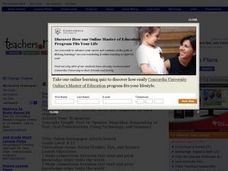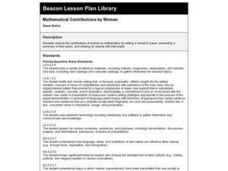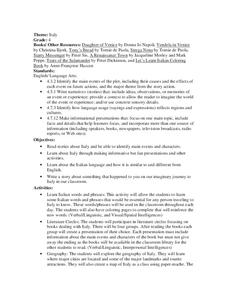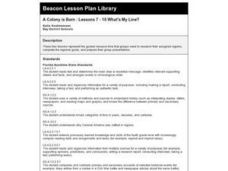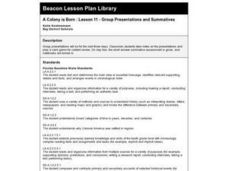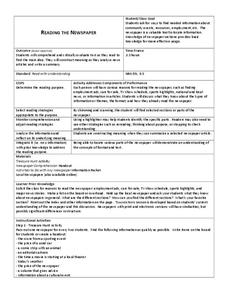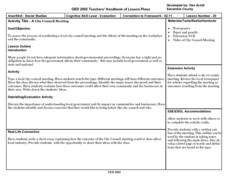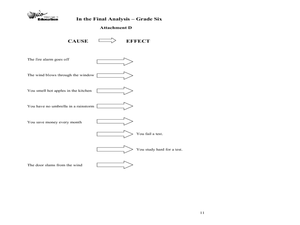Curated OER
The Weekly News, Part 2
Sixth graders use articles they've previously written to produce a school news broadcast. In this journalism lesson, 6th graders discuss the goals of a news broadcast and use previously written articles to plan a news broadcast. Students...
Curated OER
Jingles Sell
Students explore the different persuasive techniques used in commercial and print advertisements. Students then analyze a variety of print ads and discuss the effects of a country's political, economic, and social climates on its...
Curated OER
Online Newspaper Search
Students use the Internet to research an article. When they find an article they like, it be printed and they highlight the important information and present to the class.
Curated OER
Mathematical Contributions By Women
Third graders explore the contributions of women to mathematics by writing a research paper, presenting a summary to their peers, and sharing an activity with their peers. They use a variety of reference materials to gather information...
Curated OER
Biographical Research Paper
Students choose a subject for a biographical research paper. They use books, the Internet, encyclopedias and articles to gather information on a determined subject then follow a rubric to write a research paper.
Curated OER
Picasso; Comparing Blue and Rose Periods
Third graders research Picasso's art career. They use a word processor to create a Venn diagram which compares Picasso's Blue and Rose Periods.
Curated OER
Looking After Pets
Students work in groups to compose their own "Duty of Care" for pets and make their own individual list from this discussion and illustrate it with drawing or images taken from magazines, websites or newspapers.
Curated OER
Italy
Students read stories about Italy and identify main events and characters. They take an imaginary trip to Italy and write a story about their adventures. In addition, they practice several italian words and phrases.
Curated OER
Hoax Calls
Sixth graders discuss what they know about hoax calls and discover that they are illegal and can endanger lives. They also note that hoax calls can be traced and are recorded. They discuss why some people might want to make a hoax call...
Curated OER
A Colony is Born : Lesson 5 - Dear Mem
Discover colonies! Young historians will listen to a primary source journal entry read aloud with a backdrop of wave sounds. They discuss the entry, add historical facts to a chart and personal insights to another. Then they listen to...
Curated OER
Writing Headlines
Students define the purpose of headlines and practice writing their own. In this news writing lesson, students define the elements of headlines and view examples. Students read a news story in groups and create a headline for it....
Curated OER
A Colony is Born : Lesson 6 -To Leave or Not to Leave
Fifth graders connect reasons for coming to the New World with identity. The create identities and place them in one of three settled regions. They refer to prior study notes in their Colonial Notebooks to establish their identities.
Curated OER
A Colony is Born : Lessons 7 - 10 What's My Line?
Fifth graders research their assigned regions, complete regional guide and prepare presentations about the New World colonists. They refer to "Everyday LIfe: Colonial Times" as well as searching marked internet sites.
Curated OER
A Colony is Born : Lesson 11 - Group Presentations and Summatives
Fifth graders give presentations on colonial research. The others take notes on the presentations. They play a card game which helps them review content. They take a summative assessment and present their research notebooks.
Curated OER
Understanding James Madison The Father of the Constitution
Students research James Madison and create a table of his strengths and weaknesses. In this James Madison lesson, students read Jean Fritz's, The Great Little Madison, while developing their research skills, vocabulary strategies, and...
Curated OER
Reading the Newspaper
Students read the newspaper. In this newspaper instructional activity, students become familiar with the various parts of a newspaper. They read specific parts, highlight important information and summarize what they read.
Curated OER
What is Diabetes?
Students examine basic information about diabetes and related vocabulary words. They explore various health websites, complete a worksheet, discuss the worksheet answers and discuss diabetes myths vs. facts.
Curated OER
The Farmer Cares for the Land
Students explore farming by creating visual demonstrations. In this agriculture lesson, students read assigned text about a farmer's duty and identify the events that have taken place in the history of agriculture. Students collaborate...
Curated OER
Huck Finn Chapter Questions
Learners answer chapter questions to evaluate the novel, The Adventures of Huckleberry Finn.
Curated OER
Literary Newspaper: Candide
Prejudice? Religious intolerance? Political sedition? Class distinction? Plight of women? Voltaire satire, anyone? A literary newspaper offers an opportunity for readers of Candide to make text-to-self and text-to-world connections as...
Curated OER
A City Council Meeting
Here is an interesting plan for introducing your pupils to the workings of the local city council. The teacher must go videotape a city council meeting in it's entirety. Learners watch the tape, and discuss what they observed from the...
Curated OER
The Final Analysis: Cause and Effect, Fact and Opinion
Middle schoolers read and review informational texts, analyze cause and effect, and distinguish fact from opinion. They assess a "one-minute mystery" you read aloud for cause and effect relationships. Resource includes complete set of...
Curated OER
Who in the World Is....?
Young scholars access how to scan the newspaper for relevant information. They become acquainted with the sections of the newspaper. Students practice summarizing what they have learned.
Curated OER
Earthquake!
Students gain an understanding of earthquakes. They examine vocabulary associated with earthquakes, how earthquakes happen, and preventive measures taken to diminish damage or harm in the event that an earthquake should happen.




